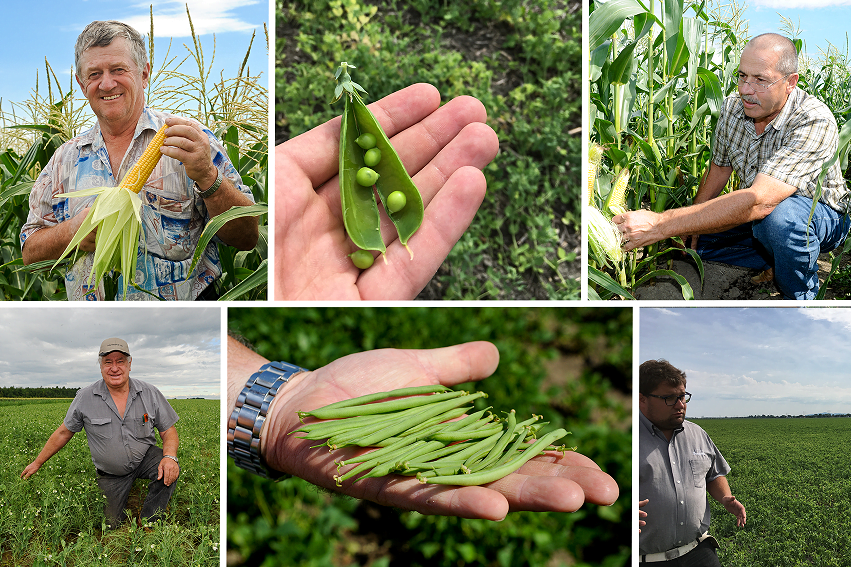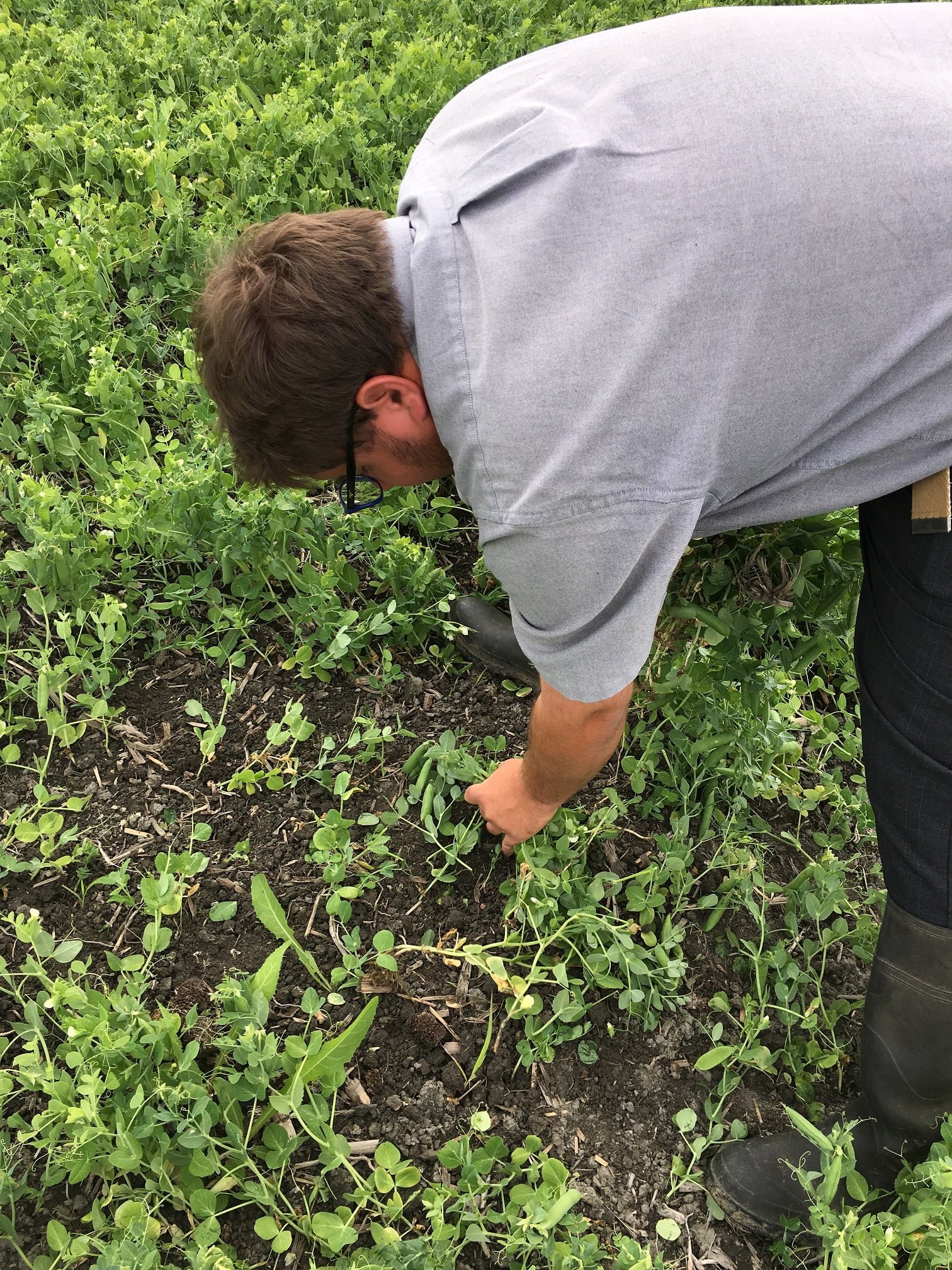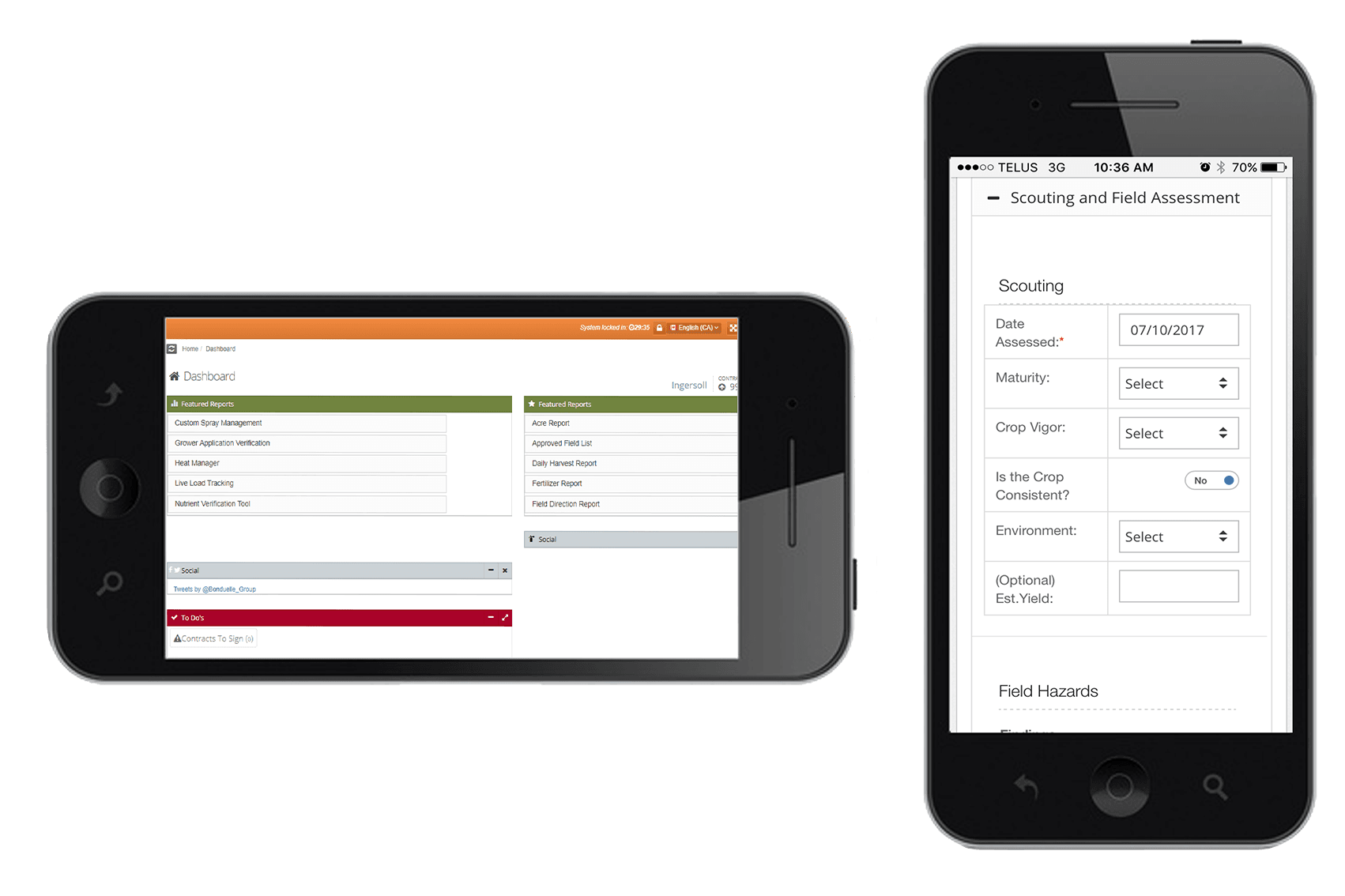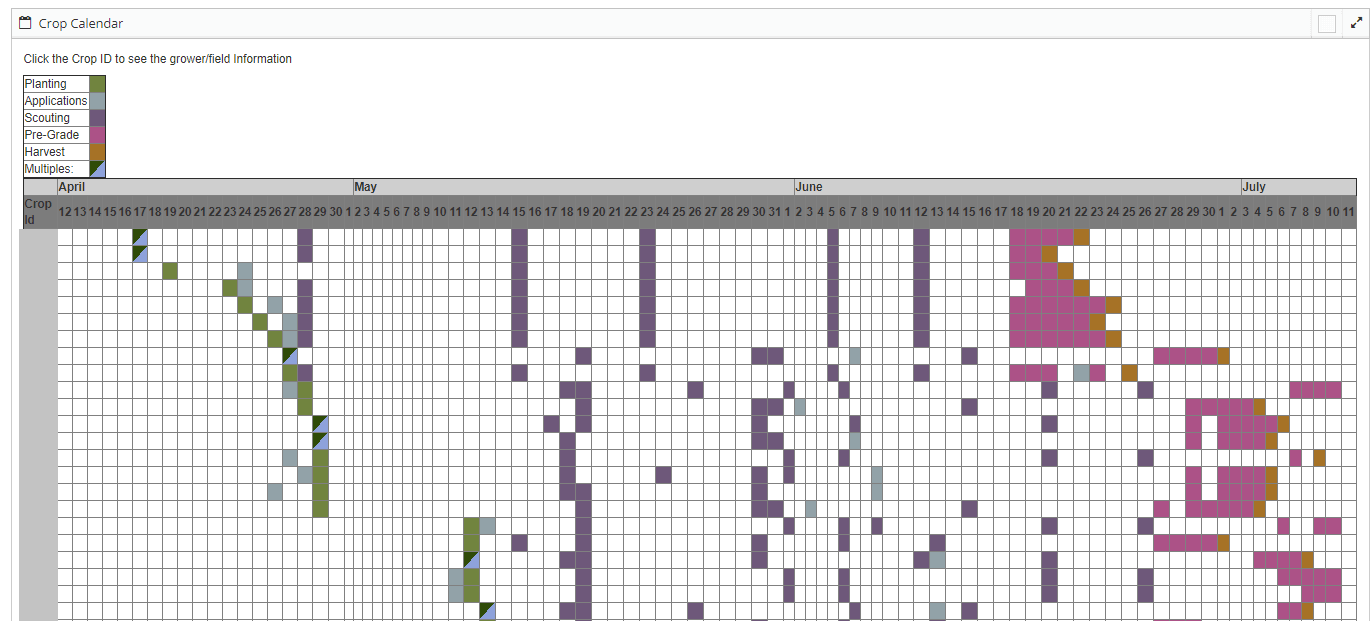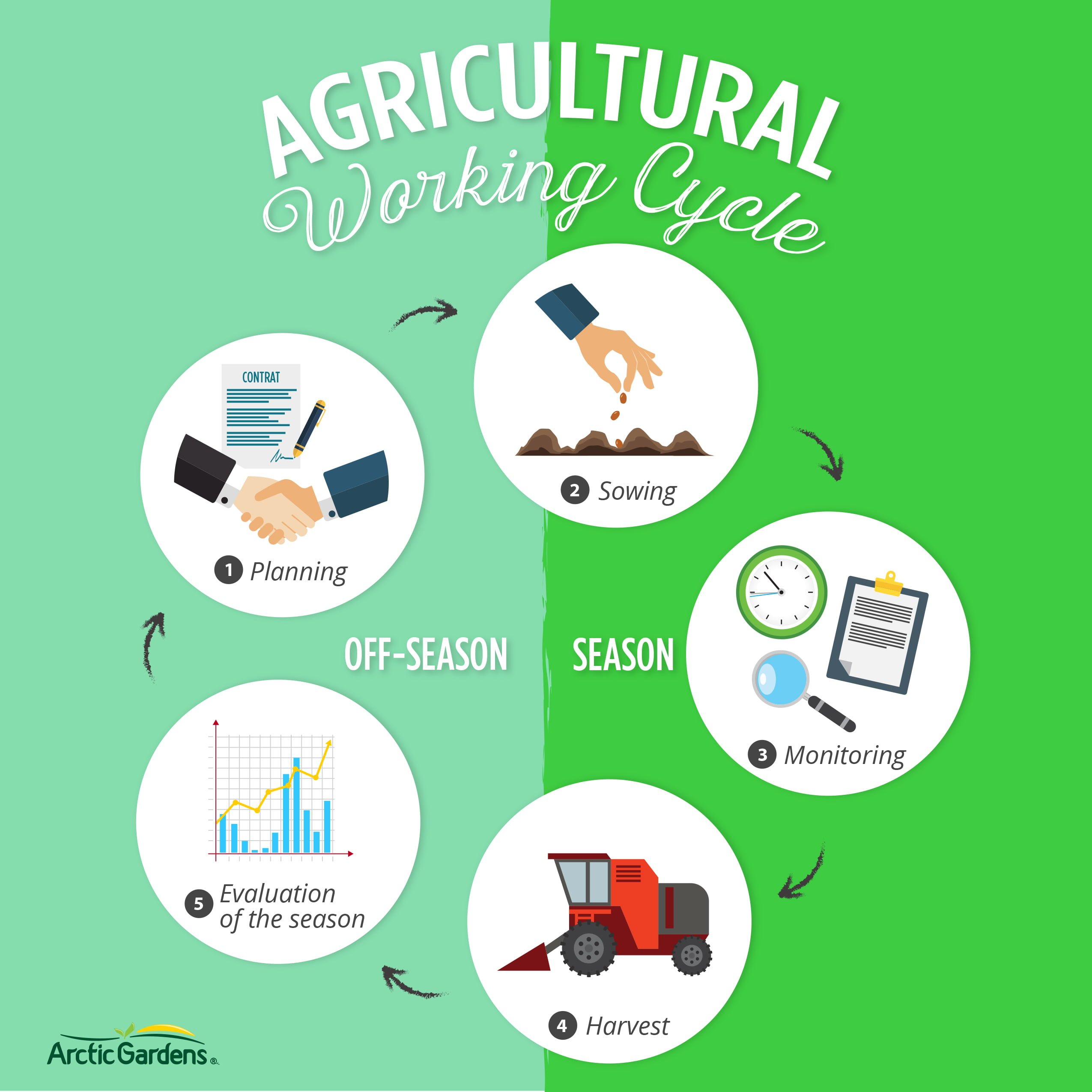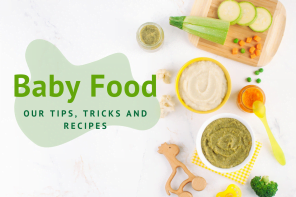When you enjoy Arctic Gardens’ products, maybe you forget that they’re vegetables actually grown on farmland. Our veggies are grown in the fields by people who are passionate about agriculture. To produce quality veggies in large quantity, in a climate like ours, it certainly takes expertise. Discover the know-how needed for commercial farming and the people behind the products you buy.
The agricultural work at Arctic Gardens
A passion for veggies
It only takes a discussion with one of our field technicians to feel the passion for growing vegetables. Growing veggies is a job that requires a lot of time, patience and organization. The dedication of everyone who is involved in producing our products is essential to our success. Field technicians work long days to make a bridge between Arctic Gardens and the farmers. They’re in the fields excited by the tangible, by daily human contact and by the sheer pleasure of working outdoors.
Throughout the season, everybody’s efforts can be seen right up until the moment of harvest. Frédéric Audet, a field technician who we followed for a day, loves his work because there’s always something happening that gives him a rush and because he gets to see the fruits of his labour at the moment of harvest. It’s the passionate people like Frédéric who allow us to provide quality products to you.
Growing vegetables
Before veggies can be sent to the plant for freezing, packaging and distribution to a grocery store near you, our agricultural partners and experts have to do a few things first. From sowing to harvesting, many people participate in the amazing process of growing vegetables. Once the seeds are delivered to the farmers, they’re planted. According to one estimate, managers, field technicians and farmers determine a harvest date. Seedling growth is closely monitored. As the harvest date approaches, technicians and their interns take samples more frequently to ensure harvesting at the right time.
As many factors can influence when veggies are ready to be harvested, everyone must do their part of the job properly and work with others. When harvest approaches for peas, for example, field technicians or their interns take samples every two days.
Starting at 5 o’clock in the morning, samples are taken in the fields and sent to the plant for testing. Depending on the results, the harvest date can be adjusted and everyone must adapt to ensure that quality veggies are produced.
At harvest, field techs and growers monitor everything that’s happening. Once the veggies are harvested, a truck brings them to the plant for processing. Coordinating all the steps involved and the harvesting of various fields is pretty complex, but the advanced technologies that Arctic Gardens uses help make everything easier. Continue reading and you’ll see how farming and technology go hand in hand.
At Arctic Gardens, we work with several local producers who grow our vegetables in fields of 20 to 30 hectares, not large commercial fields. Of course, some fields are bigger than others, but we’re committed to supporting growers from here. See for yourself how our farm lands are organized by reading our We Grow Here! article.
Resources and knowledge
Our team is involved at each stage. That’s why we need hardworking, competent people at all levels. Whether it be in management, supervising or growing itself, expertise is a must. Here are the main roles from sowing to monitoring to harvesting veggies.
Agricultural managers
Canada is a vast country, so naturally, it’s better to break it down into regions to manage it efficiently and work it in a more global way. This way, managing can be better adapted to the climate and conditions of each region. With the help of field techs, managers establish the contracts with producers. Then through the techs, they monitor the growing process. They also go into the fields themselves. The field techs report to them. For their part, technical program managers and coordinators ensure that the practices and efficiency of growing different vegetables are improved.
They’re the ones who make sure that objectives are achieved and that technologies and resources are properly used. In fact, Jennifer Thompson, a farm manager from Ontario, launched the project to build a platform called AgPod. Thanks to Jennifer and the entire team she worked with, AdPod is now used by all of Bonduelle Americas to track the process in its entirety from field to finished product.
Field Technicians 
Field technicians, who are also known as fieldmen, are the link between the company and the producers. As veggies grow in the fields, they have to be monitored by someone physically in the field. The fieldmen and their interns, visit all the plantations they’re responsible for at least once a week. They go to the field, inspect it, discuss with the producer, make recommendations, then write a report to keep the agricultural manager informed of the plants’ progress or any challenges that may have come up. In general, farm techs are responsible for about 30 producers of one single vegetable.
During the harvest season, whether from planting to harvesting, being a field tech means long days: seven days a week from sunrise to sunset. The field tech team must go from field to field to follow up with the producers. To do this job, you have to be a dedicated and a really hard worker. If it weren’t for them, field techs wouldn’t take a day off during the season. They love their work and the fact that the producers can count on them. Of course, because the seasonal schedule is intense, once the season is over, the techs can slow down a bit and work on the financials and plan the seasons to come.
Farmers 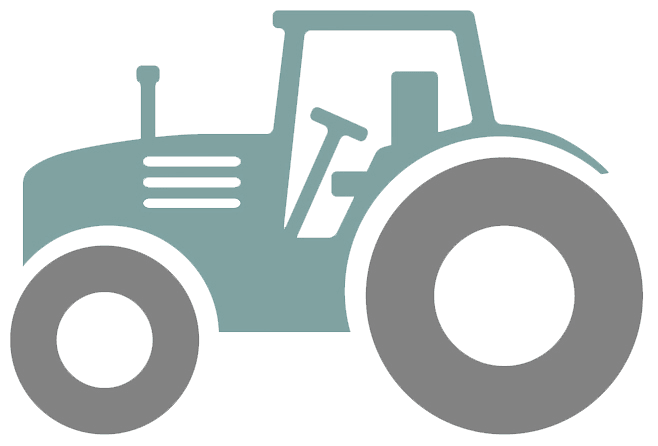
Every year, we decide with the farmers, managers and farm techs we work with, which vegetables will be grown and in which field. Bonduelle, manufacturer behind Arctic Gardens, regularly reviews contracts with them to ensure efficient crop rotation and consequently, good quality soil. Growers are happy with their collaboration with our brand and appreciate the expertise of our field techs.
At Bonduelle, the process is designed to simplify farmers’ lives. They do the work they love, put into practice their expertise and we give them the necessary complementary support. Bonduelle provides the seeds, the producers sow them with the field tech, then ensure the proper monitoring for the seedlings’ healthy growth. Once harvesting is done, Bonduelle takes over the rest of the process: transport, freezing, warehousing, distribution, etc.
The entire process is made so that farmers don’t feel alone. We make a concerted effort so they can collaborate with us easily. At Bonduelle, we believe in the expertise of local producers and that’s why we want to maintain lasting relationships with them. For a close up of one of our farmers, read our article entitled, Veggies from here? They’re in the bag!
Technology in agriculture
 Some can be fooled into thinking that farming hasn’t evolved much over the years. In reality, more and more advanced technologies are used in farming and Bonduelle isn’t the only one. In order to deliver large quantities of quality products to consumers like you, technology is essential to us.
Some can be fooled into thinking that farming hasn’t evolved much over the years. In reality, more and more advanced technologies are used in farming and Bonduelle isn’t the only one. In order to deliver large quantities of quality products to consumers like you, technology is essential to us.
Why is it essential?
In order to deliver quality frozen products, each stage of the process must unfold without a hitch. In light of the quantity of stakeholders and partners who are involved in growing veggies, technology is what allows us to provide a strong framework for the farming process. The platforms used gather information and keep everyone up-to-date on what’s going on. The many reports completed by field supervisors are entered there. Thanks to the integration of technology, we can foresee problems and prevent the same situations from occurring in other fields.
Technology also allows us to better structure the process and consequently, better plan the harvest.
How do we use it?
In Quebec, managers and technicicans use a software to create maps so they know which vegetables are harvested from which fields by which producer and where precisely. The image below gives you an overview of what they’ve developed to improve management and organizational efficiencies.
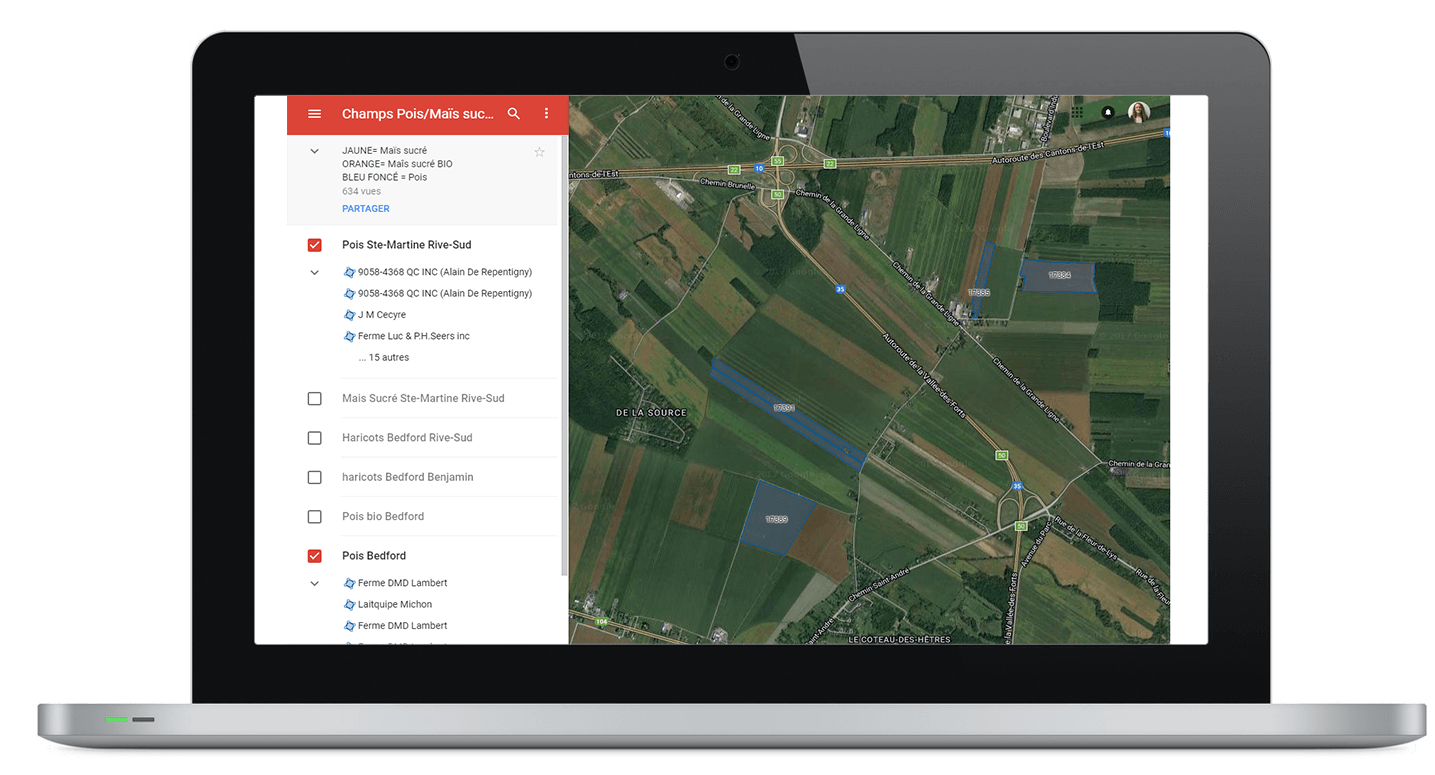 With the goal of optimizing our systems and centralizing the organizational skills from all regions, we’ve been developing the AgPod platform for the last 11 years. In fact, we’re in the midst of building a mapping system to be integrated into AgPod. This innovative software has allowed the brand to make great advancements and to be much more efficient when tracking veggies from the field to the table. Here are the top 10 features that make AgPod essential to Arctic Gardens:
With the goal of optimizing our systems and centralizing the organizational skills from all regions, we’ve been developing the AgPod platform for the last 11 years. In fact, we’re in the midst of building a mapping system to be integrated into AgPod. This innovative software has allowed the brand to make great advancements and to be much more efficient when tracking veggies from the field to the table. Here are the top 10 features that make AgPod essential to Arctic Gardens:
- The software contains a lot of information: Users have access to a lot of information when they have questions
- Easy-to-use: AdPod was designed to be easy to consult and complete. Even people who don’t often use software will find it easy to use.
- Efficient planning: Thanks to AgPod, everyone knows what to do and when to do it.
- Proper tracking: Managers and technicians can track a crop’s development in real-time. AgPod notifies them when tasks need to be completed at specific times.
- Consolidates reports that must be completed: This software allows techs to complete their reports quickly even when they’re travelling.
- Adapts well: As vegetables grow is influenced by many factors, AgPod is designed to easily adapt to unexpected, last minute changes.
- Mobile-friendly: A lot of people use AgPod when they’re on the road for work, so the platform is designed to also work on cellphones.
- Evaluates each season’s yields: When it is time to look back on crop result, the information is already on AdPod.
- Helps establish sustainable practices: AgPod consolidates information, so the various regions can benefits from each other’s results.
- Efficient resource management: AdPod can use our knowledge more effectively and communicate skills on a larger scale.
Managers, techs and farmers use AdPod. Field technicians use it every day. It’s part of their toolbox. They fill out field inspection reports, consult their task lists weekly and do close follow ups with this software. AdPod helps them work more efficiently even when they’re on the road.
It’s with AgPod that technicians can let managers know how their work is coming along. Farming takes a lot of flexibility, so to make sound decisions, communication has to be strong within the team.
The platform provides the same information to all the experts involved. With AgPod, planning work this way is efficient and the progress of each stage can be shown in several ways. The example below is a sowing calendar. This tool lets everyone concerned know what to expect and advise them of major changes.
We make sure that everyone is implicated throughout the entire process. Farmers use AdPod to make farming requests before season and to indicate when they should apply fertilizer or herbicides during the growing season. Follow-ups between the farmer and field technician is also done in person, but the AdPod platform ensures that everyone gets the right information. Of course, we’re continually developing the AgPod platform so that it improves from one year to the next.
This is the work cycle for agricultural managers, field technicians and farmers:
Naturally, after the harvest, the vegetables go on to the rest of the process : transport, freezing, warehousing, distribution and retail. To know more about the next steps, read our article From field to table.
Now that you know more about the passion and expertise behind our veggies, you just have to taste them. Here are some recipes that will open your eyes to them:
To ensure you taste our veggies at their very best, consult our usage tips.


